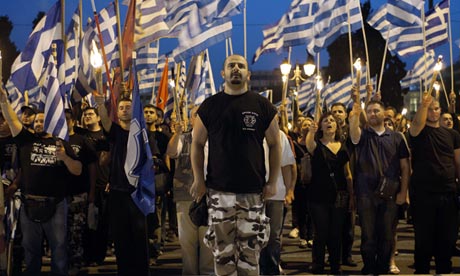This is what a Polish colleague said to me as we sat down in the lecture theatre for a talk by Zygmunt Bauman, which was held to mark 150 years of German social democracy. Upon entering the lecture theatre, it was pointed out to me that we could see a large number of nationalists in the audience on the other side. They were clearly identifiable in an academic crowd as several rows of young men, many with skinheads and wearing similar clothing. Someone had been handing out leaflets for the far-right party National Revival of Poland (NOP) (Narodowe Odrodzenie Polski), which accused Bauman of murdering Poles in his role in the communist regime. It is a small nationalist, anti-Semitic, racist, homophobic and anti-communist organisation.
As soon as Bauman entered the lecture theatre and sat down at the front, the booing started, and then they all stood up and started aggressively chanting and blowing whistles. I couldn't understand any of it but I have been told they were shouting things like "Nuremberg for communists", "better dead than red" and "we are Poland". They also had some banners including one for the Wrocław football team, which my colleague told me was linked to the growth of far-right groups in the city. It was really quite a terrifying moment, realising you are in an enclosed space with a large group of nationalist thugs clearly ready for a fight rather than just a verbal exchange.
The following video shows some of the chanting, and then the moment when the police, and then a few minutes later the anti-terrorist police, arrive in the lecture theatre. What was really great to see was the reaction from the rest of the audience, who shouted back at them, applauded when the police arrived and chanted "do widzenia" (goodbye) when they were being removed from the hall. After they left, they gave a standing ovation to Professor Bauman (also in the video).
Britain has two far-right/nationalist groups. The British National Party, originally part of the National Front and lead by Nick Griffin, has two Members of the European Parliament and until local elections this year quite a significant number of local councillors. They are a fascist, racist party which have thankfully lost a lot of electoral support this year. Unsurprisingly, a brief Google search showed that the BNP has links with the NOP in Poland. Unfortunately, and perhaps more worryingly, however, we also have the English Defence League (EDL), which is an Islamophobic protest movement consisting of football hooligans which stage street protests against Islam. According to the Wiki article, its membership is estimated to be from 35,000-100,000, a far higher number than the apparently 1000-strong National Revival of Poland.
(Nazi salutes from the EDL)
Of greatest concern in Europe, however, is the dramatic rise of Neo-Nazi party Golden Dawn in Greece, which currently has 18 MPs in Parliament, which amounted to 6.92% of the vote (425,970 votes) in the last election in 2012. According to The Guardian, it is currently sitting at around 12% in the polls and has been implicated in a growing number of violent attacks on immigrants across Greece. This is a serious concern, and something European politicians need to consider very carefully as social inequality and poverty rises across the continent.
Golden Dawn:




















.jpg)